- Home
- Patrick O'Brian
A Book of Voyages Page 2
A Book of Voyages Read online
Page 2
The public works (such as sweeping the streets, etc., etc.) are done by malefactors, who, chained two and two, perform their task attended by a guard—
P.S. You cannot buy a drug at the apothecaries here, without an order from a physician—A very prudent caution against the madness of those who choose to finish their existence with a dose of laudanum, or their neighbours with one of arsenic—
WARSAW, JANUARY 7, 1786
I got away as fast as I possibly could from Vienna; for if I had staid a week longer, I am convinced I should have staid the whole winter—
WARSAW, JANUARY, 1786
The entrance into the town of Cracow exhibits a melancholy proof that confusion ever ends in ruin—The system of government in Poland is of all others the surest source of confusion that ever yet was imagined by mankind—an elected King from the noble families, most of which think they have a right to royalty, and several really are entitled to it—
Dirty suburbs filled with Jews—and the Emperor’s eagle, are the only objects that precede the gates of Cracow—these gates are pierced by many a ball …
I had letters for several Polish ladies at Cracow—but I staid only to rest myself, and get a traineau made; for I was told I might go thus—but a couple of miles from the town I was obliged to take my coach off the sledge; and here I must observe, Sir, that the Prince Galitzin at Vienna, was very much mistaken, when he told me, he should advise me to have just such a coach as mine made, if I were not already mistress of such a one—
I hung more than once upon fir-trees; the track of the road being too narrow for my wide carriage—and when travellers come into Germany—I think they ought to part with their French and English carriages—as the carriages of our northern countries are liable to inconveniences and accidents—
I staid two hours one night, so fastened with the hind-wheel upon a fir-tree, that six men could not stir it—and peasants were called to cut down the tree—before I could proceed—
When I arrived at Warsaw, I found my apartments had been warmed and ready two days before my arrival; the Comte de Stackelberg having bespoke them, by the desire of Prince Galitzin—and the Russian Minister C— de S— waited on me—He is sensible, and even witty—he presented me to the King, the day after my arrival, in the evening—The King received us in his study; I was accompanied by the Grand Marechal’s wife, who is one of the King’s nieces—You, Sir, do not speak better French and English than that amiable Sovereign—he told me he had been in England thirty years past, and asked me if Mr. W— [alpole] was still living—not only living I replied, Sir; but in good spirits; for I have a charming letter in my pocket from him—He said, if there was nothing imprudent in his request, he would ask to see it. He imagined Mr. W.’s stile must be uncommon; I gave him the letter—he put it in his pocket after reading it, and told me, as his sister, the Princess of Cracovia did not understand English, he should translate it into French for her; and if I would dine with him two days after, he would read me his translation, which indeed surprized me—He must be a very elegant writer in every language he chooses to profess—I wish I had dared to have asked him for a copy—
I make visits in a new stile here—in the Comte de Stackelberg’s coach and six—and a couple of equerries at the two coach windows on horseback—The Polish ladies seem to have much taste—magnificence—spirit and gaiety—they are polite and lively—excessively accomplished—partial to the English.
I have seen several dwarfs here—who with equerries stand in drawing-rooms of the great houses, and hear all the conversation that passes—an uncomfortable custom I think; and which in any other country would be dangerous; but here servants and dependants are the absolute property of the master—and their fidelity in general is equal to their subjection; to the credit of the Polish nobles, I believe there are few servants that, having proved for eight or ten years their attachment, are not dismissed with a pension for life. I found the French maid, the Princess C—had from me, in this situation; nine years service had obtained a hundred pounds a year, and a farm of sixty acres of land for the rest of her life—she seems the happiest creature in the world—
I am sorry to quit this place so soon; not that there is anything in this flat country that would tempt me to see the beauties of it in the spring—but the King’s acquaintance, with that of some of the ladies—and Monsieur de Stackelberg’s conversation, I am sorry to quit.
PETERSBURGH, FEBRUARY 8, 1786
The road between Warsaw and this place is one insipid flat—except just in and about the town of Nerva, where I took a sledge and flew hither.
I am something like a country Miss, gaping at the window all day here—every creature that goes about the streets, seem as if they were in a violent hurry—they drive full gallop—traineaus with one horse ply at the corners of the streets as do our hackney-coaches and chairs—Mr. S— informed me, it belonged to my dignity to have six horses to my coach, in order to pay my visits; and I beg you will imagine my surprise, when I found I had a coachman on the box, with three postillions, one to each pair of horses—and these sitting on the right-hand, I go thus, full gallop, running races with every other attelage that falls in my way—the streets are luckily wide—and custom makes the danger less than one should imagine.
PETERSBURGH, FRIDAY, FEBRUARY 18, 1786
I was to have been presented to the Empress next Sunday—but she graciously sent me word to come to the Hermitage on Thursday, where she keeps her court in the evening every week—and has alternately a French play or an Italian opera—I cannot conceive why this building which she has added to the palace is called the Hermitage; it is a long suite of rooms, full of fine pictures. You are not ignorant, dear Sir, of the many collections the Empress has purchased; among the rest Lord Orford’s; Petersburgh is a chearful and fine looking town; the streets are extremely wide and long—the houses stucco’d to imitate white stone; none above three stories high—which certainly adds to the lively and airy appearance of them—I think, Sir, that not only the town, but the manner of living is upon too large a scale; the nobles seem to vie with one another in extravagancies of every sort, particularly in foreign luxuries and fashion—The fashion of the day is most ridiculous and improper for this climate; French gauzes and flowers were not intended for Russian beauties—and they are sold at a price here which must ruin the buyers.
There are buildings erected for the reception of Arts and Sciences of every kind; for artists or amateurs, though but the surplus of Italy, France and England, would find handsome encouragement and house-room from the Empress, whose respect for talents, and generosity to those who possess them, have induced some, and would many more, to fix in the present capital of this vast empire; but alas! Sir, eight months of winter; and the horrid cold I feel, must congeal the warmest imagination.
From Cherson, the new town on the Turkish frontiers, which is one thousand six hundred miles from hence, are brought many provisions; from Archangel likewise this town is provided, and from Astracan on the Caspian Sea, near two thousand miles, all the dainties, such as grapes, pease, beans, artichokes, are brought—It is natural to suppose, that the necessaries of life are dear, from these circumstances; but some of them are extremely cheap—and I believe Russia is one of the cheapest countries in the world to live in; if French wines and fashions, and English comforts can be dispensed with—To these last I never felt so much attachment as at this moment—Dans le Ligne Anglais, a quarter of this town, where the English merchants live, I find English grates, English coal, and English hospitality, to make me welcome, and the fire-side chearful—
We are in the last part of the carnival and balls; those given by the Ambassadors are very superb—Mr. de Segur, and the Duc de Serra Capriola, the Neapolitan Minister, have each given one in a very magnificent style—
I was presented to the Grand Duchess the same night that I waited upon the Empress—She has since been brought to bed—There are some young Russian ladies very pretty and much accomplished—many of th
em sigh after a different climate from their own—here the houses are decorated with the most sumptuous furniture from every country—but you come into a drawing-room, where the floor is of the finest inlaid woods, through a staircase made of the coarsest wood in the rudest manner, and stinking with dirt—The postillions wear sheep-skins—and at a ball, when a nobleman has proposed his hand to a fair lady—he often kisses her before the whole company—
You may have heard much of Prince Potemkin; I see him everywhere, but he is reserved and converses very little with ladies—I was invited by him to dine in an immense palace he is building in the suburbs; the only room finished is too particular not to be described; it is three hundred feet in length, and on the side opposite the windows there are two rows of stone pillars, whose height and breadth are proportioned to the immense size of the room, which is an oblong square; in the centre of which on the side where the windows are, it is formed into a semi-circle or what we call a bow—which bow forms another large space independent of, though in the room; this space was laid out by his English gardener into a shrubbery with borders of flowers, hyacinths, and narcissuses—myrtles, orange-trees, etc., etc. were in plenty—We were seven or eight ladies, and as many men—immense stoves concealed by the pillars, were heated in order to make such a hall in such a climate supportable—but I came home quite ill with cold—It was there I heard that extraordinary music performed by men and boys, each blowing a straight horn adapted to their size—sixty-five of these musicians produce a very harmonious melody, something like an immense organ. The music, the room, the cold, all was gigantic. I sat by Prince Potemkin at dinner; but except asking me to eat and drink, I cannot say I heard the sound of his voice—
Justice obliges me to say, the Empress does all she can to invite politeness, science and comforts from other countries, to cheer these regions of ice—but, until she can alter the climate, I believe it is a fruitless trial—I am informed the spring, or rather the time of year we call spring, is more melancholy than winter here, so I shall hasten my departure; but a conversation I had with the Swedish Minister, a few days past, will make me give up entirely the thoughts of returning into Germany through Sweden and Denmark—I shall in my next have the honour of repeating it to you.
I promised to give you an account of the conversation with the Minister, here it is—
M. S— I have been told, that Miladi wishes to do me the honour of consulting me upon the journey she is about to take.
M— Yes, Monsieur, people say that it is very risky to traverse these ice fields, and I desire to know how to do so because, whichever way I go, I wish to travel mostly in a traineau, as I detest the jolting of an ordinary carriage, and find a traineau very agreeable—
M. S— Does Miladi know that, to travel from here to Sweden, a third horse is harnessed in front of the two others; at a very considerable distance in the dangerous parts—
M— What do you mean by dangerous parts?—
M. S— Where the ice is liable to break—and the horse is harnessed with very long cords; he is called the enfant perdu—because, if the ice cracks, the cords are quickly cut; the horse disappears for ever, and the travellers retrace their steps—
M— As I have never started on a voyage in order to retrace my steps, and as it seems that I run the risk of becoming an enfant perdu myself, if I undertake this journey—I will put off my visit to your country for another occasion, Monsieur l’Ambassadeur; and so we talked of other things—
I shall now prepare every thing to visit the Crimea or rather the Tauride; I have been told it is a very beautiful country; and I confess I am not sorry this enfant perdu gives me a good excuse for turning my steps towards Constantinople—
I am speaking without any partiality, dear Sir; but I do not see here the prejudices of the English, the conceit of the French, nor the stiff German pride—which national foibles make often good people of each nation extremely disagreeable. I am assured the Russians are deceitful—it may be so; but as I do not desire to have intimacies, I am much better pleased to find new acquaintances pleasant and civil than morose or pert—
P.S. I am not a little surprised to hear people say: I shall inherit so many hundred peasants, or such a one lost a village—it is the number of men, and not of acres, that make a fortune great here; so that a plague or any distemper that would prove mortal to the peasants, would be death to the nobles’ pockets likewise—
The Vicechancellor, Comte d’Osterman, is obliged to have a table for sixty foreigners every Wednesday; and a widow, Princess de Galitzin, a supper once a week—at Mons. d’Osterman’s too, a ball every Sunday night. The Empress is at the expence of these dinners and suppers—and, I confess, I think it an excellent and royal idea, to be certain of having houses open for the entertainment of foreign ministers and strangers of distinction—There is a custom here which I think very abominable; noblemen, who are engaged to marry young ladies, make no ceremony, but embrace them in the midst of a large company at a ball—
I have mentioned to a few people my intention of seeing the Crimea; and I am told that the air is unwholesome, the waters poisonous, and that I shall certainly die if I go there; but as in the great world a new acquired country, like a new beauty, finds detractors, I am not in the least alarmed; for a person, not a Russian, who has been there on speculation, has given me so charming a description of it, that I should not be sorry to purchase a Tartarian estate.
MOSCOW, FEBRUARY 29, 1786
I left my coach at Petersburgh, and hired for myself and my small suite, the carriages of the country, called Kibitkas; they are exactly like cradles, the head having windows to the front which let down; I can sit or lay down, and feel in one like a great child, very comfortably defended from the cold by pillows and blankets—These carriages are upon sledges, and where the road is good, this conveyance is comfortable and not fatiguing; but from the incredible quantity of sledges that go constantly upon the track of snow, it is worn in tracks like a road; and from the shaking and violent thumps the carriage receives, I am convinced the hardest head might be broken. I was overturned twice; the postillions I fancy are used to such accidents; for they get quietly off their horse, set the carriage up again, and never ask if the traveller is hurt—Their method of driving is singular; they sit behind three horses that are harnessed abreast—a shrill whistling noise, or a savage kind of shriek is the signal for the horses to set off, which they do full gallop; and when their pace slackens, the driver waves his right-hand, shrieks or whistles, and the horses obey. I would never advise a traveller to set out from Petersburgh as I have, just at the end of the carnival; he might with some reason suppose it is a religious duty for the Russian peasant to be drunk; in most villages I saw a sledge loaded with young men and women in such a manner, that four horses would have been more proper to draw it than one, which wretched beast was obliged to fly with this noisy company up and down the village, which is generally composed of houses in straight rows on each side of the public road—The girls are dressed in their holiday-clothes, and some are beautiful, and do not look less so from various coloured handkerchiefs tied over their forehead, in a becoming and pittoresque manner. The Russian peasant is a fine, stout, straight, well-looking man; some of the women, as I said before, are uncommonly pretty; but the general whiteness of their teeth is something that cannot be conceived; it frequently happened that all the men of the village were in a circle round my carriages—and rows of the most beautiful oriental pearl cannot be more regular and white than their teeth—It is a matter of great astonishment to me, how the infants outlive the treatment they receive, till they are able to crawl into the air; there is a kind of space or entresol over every stove, in which the husband, wife and children lie the greatest part of the day, and where they sleep at night—the heat appeared to me so great that I have no conception how they bear it; but they were as much surprised at me for seeking a door or window in every house I was obliged to go into, as I could possibly be at their living in a manner withou
t air. The children look all pale and sickly, till they are five or six years old. The houses and dresses of the peasants are by no means uncomfortable; the first is generally composed of wood, the latter of sheep-skins; but trees laid horizontally one upon another makes a very strong wall, and the climate requires a warm skin for clothing—It might appear to English minds, that a people who are in a manner the property of their lord, suffer many of the afflictions that attend slavery; but the very circumstances of their persons being the property insures them the indulgence of their master for the preservation of their lives; and that master stands between them and the power of a despotic government or a brutal soldiery. Beside, my dear Sir, the invaluable advantage which these peasants have, as in paying annually a very small sum each, and cultivating as many acres of land as he thinks fit, his fortune depends entirely upon his own industry; each man only pays about the value of half-a-guinea a year—If his lord would raise this tax too high, or make their vassals suffer—misery and desertion would ruin his fortune, not theirs.
MOSCOW, MARCH 3, 1786
I believe I have not told you, that I am possessed of all the instructions to proceed upon this new journey in a very pleasant manner. The commanders at Krementchouck and at Cherson are informed of my intention to proceed to Perekop, where I shall enter into that peninsula called the Tauride … in which there is at present about thirty thousand of the Empress’s troops, including five thousand Cossacks in her pay; which I am very curious to see. The Khan’s palaces, noble Tartar houses, and others are prepared for her reception, in which I am assured I shall be received and treated perfectly well—
CHERSON, MARCH 9, 1786
I was obliged to put my kibitkas on wheels at a vile little town called Soumi, before I arrived at Pultawa—Notwithstanding there might have been many things worth stopping to look at in the immense town of Moscow, I was so impatient to meet the spring, that I would not send my name to any person whose civilities would have obliged me to stay. I cannot say that Moscow gives me any idea than of a large village, or many villages joined, as the houses stand at such a distance, and it is such a terrible way to go to visit things or people, that I should have made as many long journeys in a week, as there are days in one, had I staid—What is particularly gaudy and ugly at Moscow are the steeples—square lumps of different coloured bricks and gilt spires or ovals; they make a very Gothic appearance, but it is thought a public beauty here; a widow lady was just dead, who having outlived all the people that she loved, she left an immense sum of money to gild with the purest gold, the top of one of the steeples—

 The Final Unfinished Voyage of Jack Aubrey
The Final Unfinished Voyage of Jack Aubrey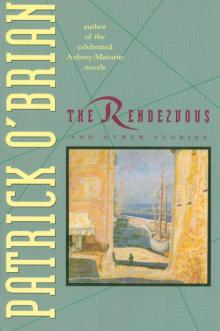 The Rendezvous and Other Stories
The Rendezvous and Other Stories Caesar: The Life Story of a Panda-Leopard
Caesar: The Life Story of a Panda-Leopard The Hundred Days
The Hundred Days The Yellow Admiral
The Yellow Admiral The Fortune of War
The Fortune of War The Mauritius Command
The Mauritius Command Beasts Royal: Twelve Tales of Adventure
Beasts Royal: Twelve Tales of Adventure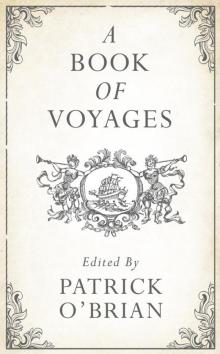 A Book of Voyages
A Book of Voyages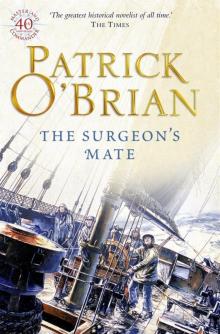 The Surgeon's Mate
The Surgeon's Mate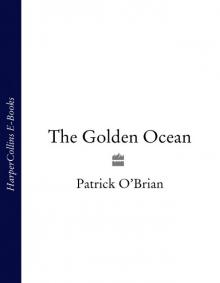 The Golden Ocean
The Golden Ocean Hussein: An Entertainment
Hussein: An Entertainment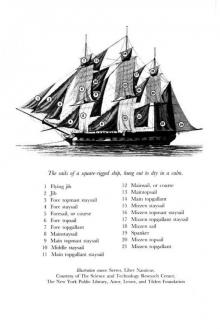 H.M.S. Surprise
H.M.S. Surprise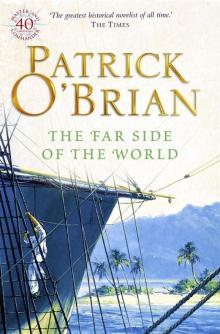 The Far Side of the World
The Far Side of the World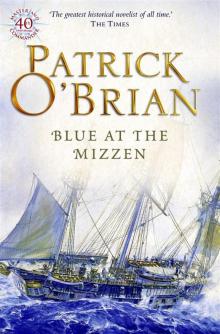 Blue at the Mizzen
Blue at the Mizzen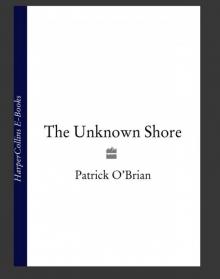 The Unknown Shore
The Unknown Shore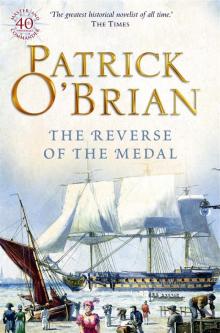 The Reverse of the Medal
The Reverse of the Medal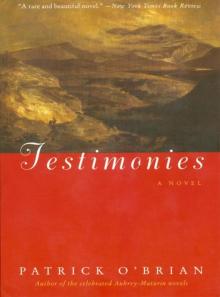 Testimonies
Testimonies Master and Commander
Master and Commander The Letter of Marque
The Letter of Marque Treason's Harbour
Treason's Harbour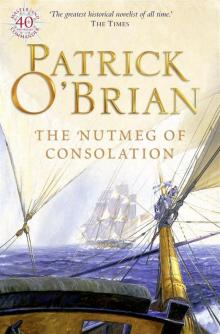 The Nutmeg of Consolation
The Nutmeg of Consolation 21: The Final Unfinished Voyage of Jack Aubrey
21: The Final Unfinished Voyage of Jack Aubrey The Thirteen-Gun Salute
The Thirteen-Gun Salute The Ionian Mission
The Ionian Mission Men-of-War
Men-of-War The Commodore
The Commodore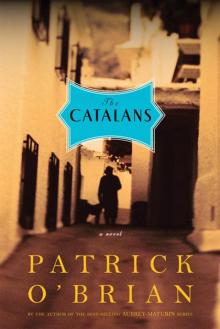 The Catalans
The Catalans Aub-Mat 08 - The Ionian Mission
Aub-Mat 08 - The Ionian Mission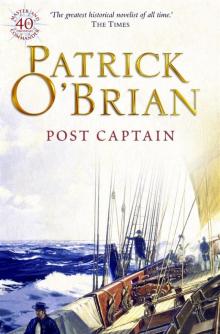 Post Captain
Post Captain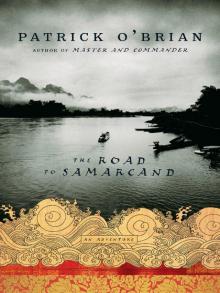 The Road to Samarcand
The Road to Samarcand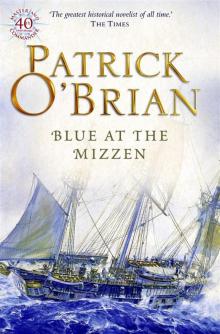 Book 20 - Blue At The Mizzen
Book 20 - Blue At The Mizzen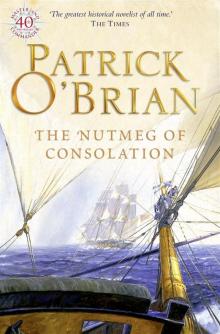 Book 14 - The Nutmeg Of Consolation
Book 14 - The Nutmeg Of Consolation Caesar
Caesar The Wine-Dark Sea
The Wine-Dark Sea Book 8 - The Ionian Mission
Book 8 - The Ionian Mission Book 12 - The Letter of Marque
Book 12 - The Letter of Marque Hussein
Hussein Book 9 - Treason's Harbour
Book 9 - Treason's Harbour Book 19 - The Hundred Days
Book 19 - The Hundred Days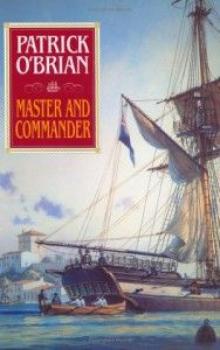 Master & Commander a-1
Master & Commander a-1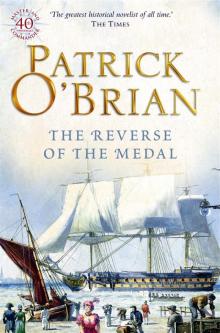 Book 11 - The Reverse Of The Medal
Book 11 - The Reverse Of The Medal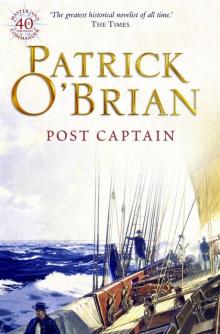 Book 2 - Post Captain
Book 2 - Post Captain The Truelove
The Truelove The Thirteen Gun Salute
The Thirteen Gun Salute Book 17 - The Commodore
Book 17 - The Commodore The Final, Unfinished Voyage of Jack Aubrey
The Final, Unfinished Voyage of Jack Aubrey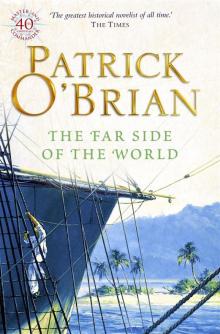 Book 10 - The Far Side Of The World
Book 10 - The Far Side Of The World Book 5 - Desolation Island
Book 5 - Desolation Island Beasts Royal
Beasts Royal Book 18 - The Yellow Admiral
Book 18 - The Yellow Admiral Book 15 - Clarissa Oakes
Book 15 - Clarissa Oakes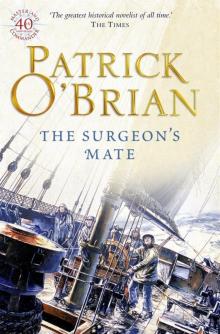 Book 7 - The Surgeon's Mate
Book 7 - The Surgeon's Mate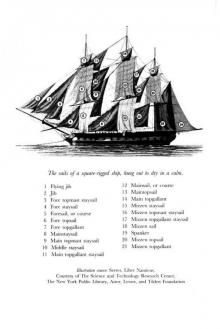 Book 3 - H.M.S. Surprise
Book 3 - H.M.S. Surprise Desolation island
Desolation island Picasso: A Biography
Picasso: A Biography Book 4 - The Mauritius Command
Book 4 - The Mauritius Command Book 1 - Master & Commander
Book 1 - Master & Commander Book 6 - The Fortune Of War
Book 6 - The Fortune Of War Book 13 - The Thirteen-Gun Salute
Book 13 - The Thirteen-Gun Salute Book 16 - The Wine-Dark Sea
Book 16 - The Wine-Dark Sea